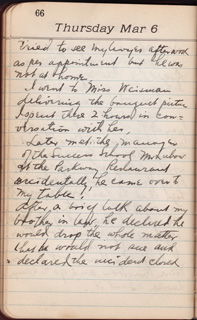
Slept late, in the evening visited
the K.H. office, the 2nd and 3rd Zionist
Districts and the remainder of the time
about 3 1/2 hours (from 11:30pm to 3:00am) at
the Cafe Royal.
Goldstein introduced me to Dr. Murdoni
the famous dramatic critic, the Dr. M.
told me of a sad experience
while in Siberia on a mission of the
Russian Jewish Relief Comittee during
the war, He met ther 500 Galician
Jews in one place, very religious
old jews and jewesses and children
were forced to live among the
wild Tatars in the villages in
Siberia, where they were forced to go
for no reason whatever, and what
horrible experiences they had to go there.
Only one picture of the Golus
————–
Matt’s Notes
Yesterday Papa talked about escaping to the movies, but today he’s got more serious things on his mind. It’s interesting to be reminded that, as modern and American as his life seems, he could relate quite closely the dark, almost regressive-sounding world of the Jews in “Dr. M’s” story. His life might easily have gone that way and he knows it.
I had a bit of trouble reading a couple of words in this entry. I’m not sure if I got “Dr. Murdoni” right or the word “Golus”. Take a look below and see if you think I got them right. Any idea who or what he could be talking about?
![]()

——————-
Updates
1/13 – I didn’t have much time to poke around when I wrote this yesterday, but a quick Web search today reveals a bit about the term “Golus.” “The Golus,” as my grandfather uses it, roughly refers to the Diaspora and the plight of Jews in exile. So, when he refers to “Dr. M’s” story of Jews being shipped to Siberia as “one picture of the Golus,” he means it’s one example of Jewish suffering in the absence of a Jewish homeland. The more strident Zionists scorned and sought to eliminate the “golus mentality,” which they saw as a tendency for Jews to resign themselves to defeat and abuse.
Papa didn’t have a violent bone in his body (my mother tells a story of him reprimanding my cousin for swatting a bee because “even a bee has a right to live”) but he must have had a touch of distaste for the image of the “golus Jew,” else he wouldn’t have pushed to nickname his B’nai Zion lodge “The Maccabeans” after the Jewish warrior heroes of the Hannukah story.
2/4 – I just came across a February 26th article in the New York Times about the Yiddish theater that mentions Cafe Royal. Looks like it was on 2nd Avenue and 12th street and was, according to the article, a hangout for Yiddish actors. My mother adds that “it was a gathering place for ‘intelligentsia’ to meet, greet and harangue each other. It was very popular back in the day.”
4/7 – Ari, an Assistant Professor of American Studies at UC Davis, adds:
…Second Avenue was known as “the Yiddish Rialto” or Yiddish Broadway, as it housed most of the Yiddish theaters in NYC. The Royal was the hangout for artists and intellectuals, who would go there before and after the shows, to debate politics, communism, and whatever they wanted to.
And:
Dr. Murdoni is, in fact, Alexander Mukdoni, a prominent and prolific Yiddish theater critic. Most of his work is rendered in Yiddish, and not much of it is translated, but there should be a good bio out there somewhere. He was quite well-respected and very serious about his criticism, scholarship and journalism.










